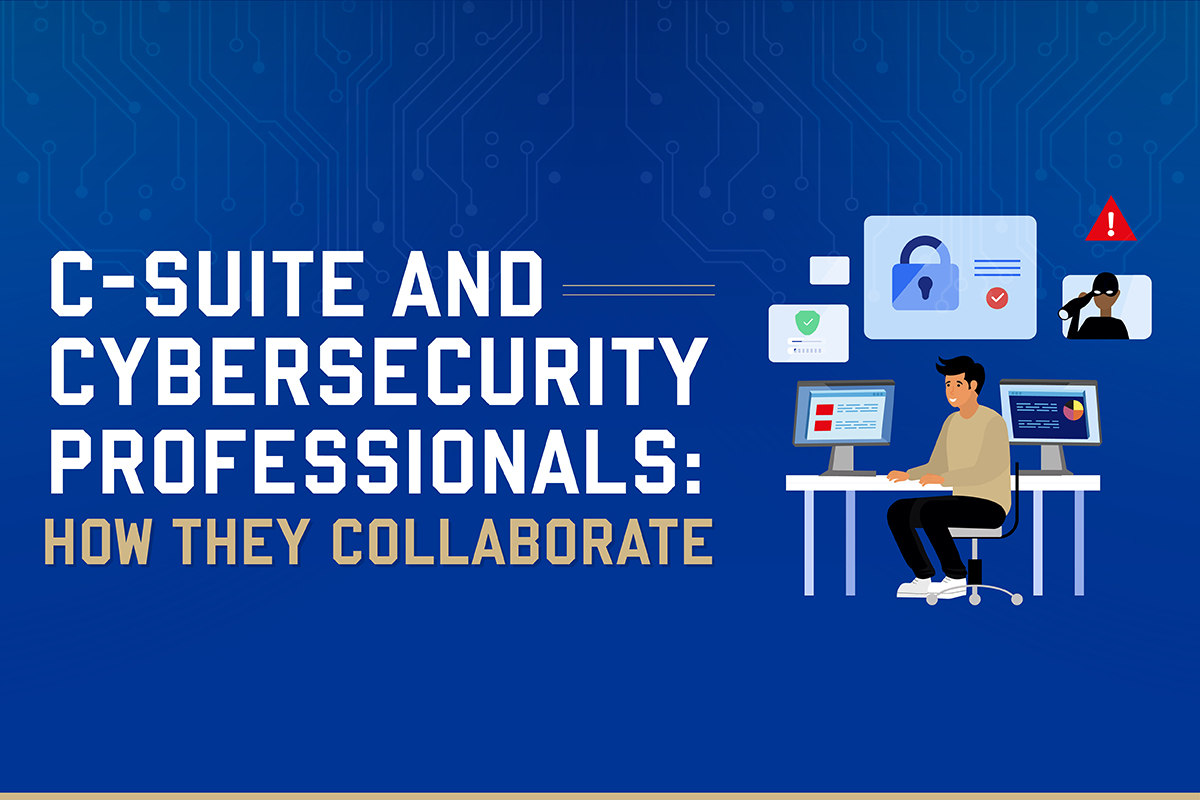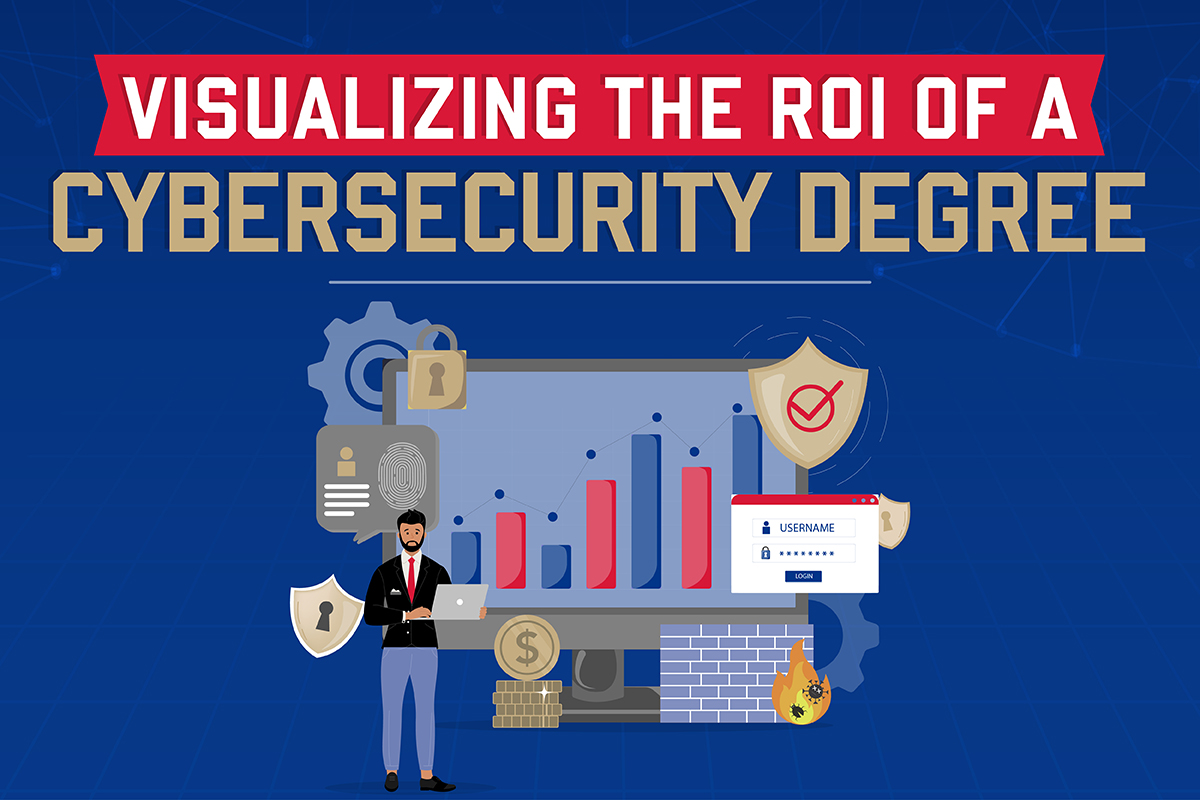How to Become a Cybersecurity Executive
Written by:
University of Tulsa
• Oct 29, 2025

In modern business, cybersecurity goes beyond the information technology (IT) department installing a firewall — it takes high-level strategic involvement. From risk management to disaster recovery protocols, cybersecurity strategies must align with an organization’s overall operational plans and vision.
Because of this, cybersecurity executives are becoming increasingly important to organizational strategies. They play a significant role in an organization’s performance and success. Professionals who want to apply their advanced cybersecurity degree to an executive-level career may be interested in learning more about the possible roles they can pursue.
The Cybersecurity Executive Roles at a Glance
Cybersecurity executives oversee organizations’ information security plans. They work with other C-suite executives to develop and implement effective, efficient strategies that cover the broad spectrum of cybersecurity. These include developing security protocols, conducting incident responses, assessing risk, and enforcing policies that protect sensitive systems. Cybersecurity executives can also play a vital role in developing an organization’s emergency data recovery plan.
Cybersecurity executives may hold various titles, each emphasizing a different aspect of network or system operations and security. These can include the following:
-
Chief Technology Officer: A CTO oversees an organization’s networks and information systems.
-
Chief Information Security Officer: A CISO manages digital systems security and data protection.
-
Chief Data Officer: A CDO oversees strategies and initiatives involving data governance and regulatory compliance.
Regardless of their title, a cybersecurity executive is mainly responsible for protecting an organization’s internal and client data from cyber attacks. By safeguarding sensitive information, they protect organizations from potentially catastrophic financial losses as a result of a data breach. The global average cost of a successful attack is about $4.4 million, according to the IBM Cost of a Data Breach Report 2025.
How to Become a Cybersecurity Executive
While there’s no one path to becoming a cybersecurity executive, the steps below give candidates the educational foundation and expertise to take on top roles.
Step 1: Earn a Bachelor’s Degree
An undergraduate degree in cybersecurity or a related field, such as computer science, gives graduates a background in the principles of the field, along with practical skills using intrusion detection systems (IDSs), firewalls, vulnerability assessment tools, and encryption software.
Step 2: Gain Work Experience
Cybersecurity executives such as CISOs typically acquire at least seven to 10 years of experience before entering the C-suite. Entry-level IT positions, such as systems analyst, offer real-world experience and open the door to mid-level roles such as ethical hacker, security auditor, and security engineer.
Step 3: Earn a Master’s Degree
An advanced degree, such as a Master of Science (M.S.) in Cyber Security, is often required to be considered for cybersecurity executive positions. Advanced degree programs offer high-level expertise in emerging technologies and help students develop the management skills needed to excel in the C-suite, particularly those with a specialized leadership track.
Step 4: Pursue Certification
While not always required, certifications validate a candidate’s skill set and demonstrate a high level of expertise, which can be appealing to potential employers. Many certifications show expertise in a specific aspect of cybersecurity, such as ethical hacking or IT governance. Sought-after certifications include the following:
-
Certified Ethical Hacker (CEH)
-
Certified Information Systems Auditor (CISA)
-
Certified Information Systems Security Professional (CISSP)
-
GIAC Security Leadership Certification (GSLC)
-
Offensive Security Certified Professional (OSCP)
Step 5: Continue Learning
Cybersecurity is constantly evolving alongside increasingly sophisticated cybercrime strategies and emerging technological innovations. Cybersecurity executives must monitor the field to track changing conditions and optimize their prevention and response strategies.
Cybersecurity Executive Salary and Job Growth
Many different positions fall under the cybersecurity executive umbrella, and they’re typically well compensated. Payscale reports that as of July 2025, the median annual salaries were about $185,100 for CISOs and about $181,400 for CTOs. Several factors can affect salaries, including education level, years of experience, and location.
The job outlook for cybersecurity executives is steady, with the U.S. Bureau of Labor Statistics (BLS) projecting a 6% increase in positions for top executives, including those in cybersecurity, between 2023 and 2033.
Pursue a Senior-Level Career in Cybersecurity
As businesses become increasingly reliant on digital systems and computer technology, the cybersecurity executive role will continue to be critical to the executive suite. By working with other executives, cybersecurity executives can help ensure that their organizations’ data systems are safe, secure, and legally compliant.
The University of Tulsa’s online M.S. in Cyber Security program can help put you on the path to the C-suite. In addition to featuring a technical track, the program offers a leadership track designed to equip you with the tools to make key strategic decisions and guide others toward important goals. Graduates can pursue roles as innovative leaders in cybersecurity, with titles such as director of cybersecurity and CISO.
Find out how we can help you build a rewarding, exciting future in cybersecurity with an M.S. in Cyber Security at TU.
Recommended Readings
Is Cybersecurity in Demand? 8 Reasons Demand Keeps Rising
Security Economics: Definition and Examples
What Are the 8 Types of Cybersecurity?
Sources:
Business Chief, “Cybersecurity Stars in the C-Suite: Why Every Role Matters”
Cochran, Cochran & Yale, The Growing Demand for Executives Who Can Mandate Digital Threats
IBM, Cost of a Data Breach Report 2025
Indeed, “How to Become a Chief Information Security Officer”
Payscale, Average Chief Information Security Officer With Cyber Security Skills Salary
Payscale, Average Chief Technology Officer (CTO) Salary


